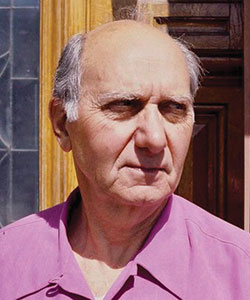
Walter Gerash
July/August 2023
Download This Article (.pdf)
Walter Gerash
November 24, 1926—May 7, 2023
 Walter Gerash died on May 7, 2023, at age 96. Gerash was one of Denver’s premier attorneys during the last half of the 20th century. In countless cases, he was in court defending political radicals and people accused of sensational crimes. Often extremely outspoken and eccentric, he blazed a trail for an alternative community.
Walter Gerash died on May 7, 2023, at age 96. Gerash was one of Denver’s premier attorneys during the last half of the 20th century. In countless cases, he was in court defending political radicals and people accused of sensational crimes. Often extremely outspoken and eccentric, he blazed a trail for an alternative community.
Gerash was born to Russian-Jewish immigrants in the Bronx on November 24, 1926. At age 17, he joined the Army. After getting out of the service, he moved to Los Angeles, where his family had been economically successful. Originally, he hoped to become a history professor, gaining a master’s in the subject from the University of Chicago. By that time, he embraced dissident opinions about the Soviet Union and essentially found himself red-baited out of the doctoral program.
Back in Los Angeles and recently married, he entered the law program of UCLA in 1953. He found it sterile, however, and faced accusations of being a member of the Communist Party. In contrast, he found a welcoming spirit when he transferred to the University of Denver College of Law in 1955. The next year he gained admission to the bar. He went to work for veteran criminal defense attorney Francis P. O’Neill. In no time, he was in the courtroom representing defendants in highly publicized cases. Often unorthodox in his approach, Gerash quickly established himself as a larger-than-life defense lawyer. He was a well-known member of the bar by the time he started a private practice in 1958.
Gerash was anything but a conventional lawyer. He constantly came up with innovative approaches. At times, he appeared totally befuddled before springing into action. A trial, he repeatedly insisted, was not just a matter of evidence, but also of the sentiments of the community. This came out when he represented people accused of breaking the law when they crusaded for civil rights or engaged in anti-war protests.
With other members of the National Lawyers Guild, a progressive association of attorneys, Gerash gained a reputation for success in the 1960s and 1970s while representing civil rights protestors, members of the Black Panther Party, student radicals, and the Chicano Crusade for Justice. He had an amazing winning record.
Typical was his stalwart defense of members of the San Francisco Mime Troupe in 1966–67 when the city accused the actors of an “indecent” performance when they mocked the political establishment and the Vietnam War during performance at the old Phipps Auditorium in City Park. He continued such political defense work, most of which was pro bono, until his retirement in the early 21st century.
Gerash also took on the defense of clients accused of sensational crimes. Among them was Ross Carlson, a troubled teenager who murdered his parents. He showed that the defendant was suffering from what was then known as multiple personality disorder. In another case, he successfully represented heavyweight boxing contender Ron Lyle against murder charges after Lyle had shot an associate. In a case broadcast on Court TV, he represented retired Denver police sergeant Jim King, who was charged with murdering four bank guards and stealing $200,000 in the so-called Father’s Day massacre on June 16, 1991. Additionally, Gerash was most successful as a personal injury attorney, winning numerous large verdicts and settlements for clients harmed by corporate negligence.
Both in court and on a personal level, Gerash often appeared as if he were highly confused. Critics accused him of having a selective memory. This was something of a guise. Suddenly, he sprung alive, tearing apart witnesses during cross-examinations. In his highly publicized trials, he came across as both a relentless fighter for his clients and something of a field marshal mobilizing his witnesses as he often ran rings around the prosecution.
Gerash was deeply committed to the city’s history. For years, his law office was in the only surviving 19th-century house in the center of the Central Business District, a personal statement of his love of the community in which he succeeded. Simultaneously, he collected art and was a devotee of mid-century modern architecture. Though not religiously observant, Gerash was proud of his Jewish heritage. Additionally, he was an extremely devoted chess player.
At times, Gerash clashed with associates and family members. He went through three marriages. In recent years, he was in assisted living. He leaves behind sons Douglass and Daniel and two grandchildren.
—Written by Phil Goodstein


